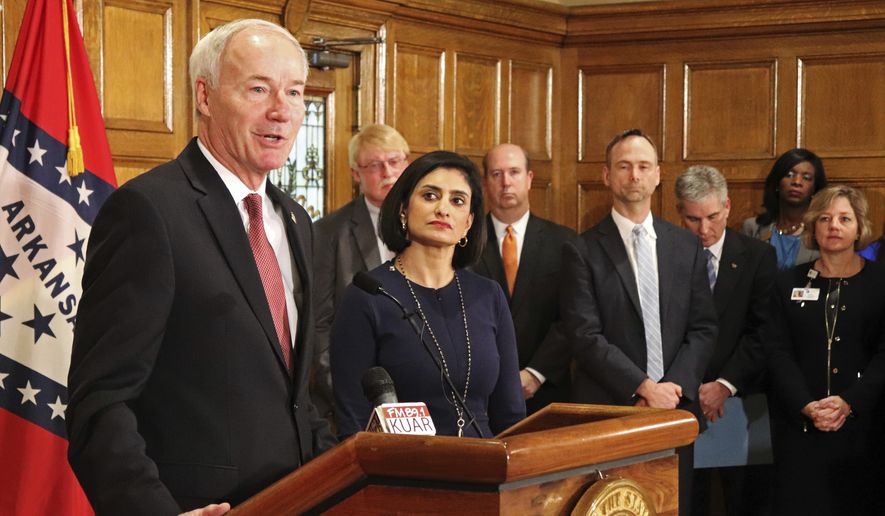The Trump administration approved Arkansas’s request to impose a work requirement on thousands of Medicaid enrollees, but put off a decision on the state’s controversial request to be able to do an Obamacare-lite expansion.
Nearly 40,000 Arkansans ages 19 to 49 will be required to perform 80 hours of work or community engagement such as volunteering or educational classes, per month. Those who fail to comply for three months will lose coverage for the rest of the calendar year.
President Obama had rebuffed states that wanted to impose work requirements on able-bodied persons under Medicaid. Mr. Trump, though, has thrown the door open, and Kentucky and Indiana have already won approval for work requirements.
Arkansas Gov. Asa Hutchinson and members of his cabinet beamed as Seema Verma, administrator of the Centers for Medicaid and Medicaid Services, signed the work waiver request. More than a dozen other states have either submitted proposals or expressed interest in similar programs.
“I have often said that Arkansans understand the dignity of work,” Mr. Hutchinson, a Republican, said. “The approval of this work requirement will go a long way to create opportunities for able-bodied working-age Arkansans to enter into training or employment and ultimately climb the economic ladder.”
Arkansas had already won approval under the Obama administration for a trial to use federal money to pay for some of its Medicaid beneficiaries to get coverage from private plans.
Opponents say the work requirements will entrap people in a maze of reporting requirements, oust them from coverage and make it harder for them to get healthy — undermining their ability to work instead of lifting them into jobs.
They’re also gearing up to oppose plans like Arkansas’s idea to cut the expanded Medicaid eligibility income threshold, which could push an estimated 60,000 people out of coverage.
“This cruel proposal should be rejected outright,” Protect Our Care said Monday.
Mr. Hutchinson’s request to limit Medicaid rolls to people at just 100 percent of the poverty level, or less than the 138 percent income rate envisioned in the law, is under consideration and is shaping up as a key test for how much leeway the Trump administration would give states to experiment.
Ms. Verma said her agency is still grappling with the request for what’s known as a “partial expansion.”
But she said they didn’t want to wait on approving the state’s work proposal, making Arkansas the third state to win permission to require some beneficiaries to hold a job or seek education or job training to keep their benefits.
“We wanted to make sure that we were moving as quickly as possible on the areas of the waiver that we were prepared to go forward with,” Ms. Verma said.
Arkansas next month will notify Medicaid recipients if they must report to work in June.
Under the Affordable Care Act, those who fall into the 100-to-138 percent of poverty range can qualify for federal subsidies on Obamacare’s exchanges, although only if they’re ineligible for Medicaid.
States struggling to balance their budgets have an incentive to shift residents into exchange plans that are subsidized by federal taxpayers alone, rather than picking up a portion of the tab under the Medicaid expansion.
Dumping previously Medicaid-eligible people into the exchanges could have an adverse effect on those states’ exchange markets, however.
Research has shown that nonexpansion states have slightly higher premiums in their exchange markets. Analysts say one reason for the disparity is that the share of the population earning 100 to 138 percent of poverty may be sicker than the rest of the individual market population, so their presence in the exchanges drives up rates.
The cost of subsidizing people on the exchanges might also raise issues about federal costs, since administrations typically require Medicaid waivers to be budget-neutral, said Robin Rudowitz, an associate director for the Program on Medicaid and the Uninsured at the Kaiser Family Foundation.
Ms. Rudowitz said CMS could be working on guidance that explains the guardrails or justification for a partial expansion, should it decide to go down that road.
CMS did something similar in its invitation to states seeking work requirements, saying the waivers would satisfy the objectives of Medicaid on the belief that work makes people healthier.
• Tom Howell Jr. can be reached at thowell@washingtontimes.com.




Please read our comment policy before commenting.